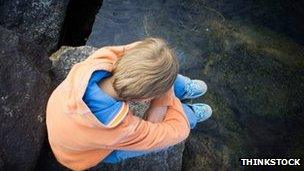Cyberbullying 'on rise' - ChildLine
- Published

The charity says it is essential that children's concerns are understood and addressed
The charity ChildLine says it has seen a large increase in the number of children contacting it with concerns about online bullying.
It saw 4,507 cases of cyberbullying in 2012-13, up from 2,410 in 2011-12.
The charity also saw a rise in concerns about self-harming, while depression and difficult family relationships were the top reasons for seeking help.
ChildLine's founder Esther Rantzen said too many of the nation's children seemed to be struggling and in despair.
During 2012-13, ChildLine counselled 278,886 children and teenagers. The charity also handled 10,961 cases where a young person raised concerns about another child.
For the first time in the charity's 28-year history, more counselling took place online (59%) than by telephone (41%).
'Bomber'
The report - Can I tell you something? - noted a significant increase in racist bullying, with more than 1,400 children telling the charity they were experiencing problems, compared with 861 the year before.
A common theme was children being called a "terrorist" or a "bomber" or being told to "go back to where they came from".
ChildLine says the instances of self-harm have steadily increased over the years and it is now affecting children at a younger age.
For example, in 2011-12, 470 12-year-old girls contacted the charity about self-harming, but this rose to 700 in 2012-13.
In total, 29,163 children and teenagers mentioned feeling suicidal, up from 22,006 in the previous year.
The ChildLine figures come a week after the Prince's Trust said as many as 750,000 young people in the UK may feel they have nothing to live for.
The trust said high unemployment rates among young people played a significant part in feelings of depression.
'Wake-up call'
Ms Rantzen said the report was a wake-up call.
"Far too many of the nation's children seem to be struggling and in despair. It's so important that we support children to talk about issues and look out for signs that they're not able to cope.
"No matter how hard-pressed we are, we must commit to giving children time and space to talk about their lives."
Peter Wanless, chief executive of the NSPCC charity, which runs ChildLine, said: "The issues facing children today are very different from those that faced us as children.
"Stranger danger, for example, rarely comes up in contacts to ChildLine but depression, self-harm, online bullying and even suicide contacts are increasing exponentially.
"If we are to help young people we need to listen to what they are telling us about the issues they are facing.
"ChildLine is one of the most important sources of information about vulnerable children in the UK and these regular snapshots will help us keep one step ahead and focused on the areas that are really concerning them right now."
A spokeswoman for the Department for Education said every school had to have measures in place by law to prevent cyberbullying. "Thanks to our new curriculum, children will soon be taught how to stay safe online, including cyberbullying, from the age of five.
"We have strengthened the powers teachers have to tackle bullying. They can search pupils for banned items, delete inappropriate images from phones and give out same-day detentions," she said.
"We are also providing more than £4m to a range of anti-bullying organisations to help schools develop strategies to tackle the problem and deal with the impact when it occurs."
ChildLine was launched in 1986 and has counselled about 3.2 million children.
ChildLine can be contacted on 0800 1111 or online at www.childline.org.uk
- Published2 January 2014
- Published24 October 2013
- Published1 March 2013
- Published6 March 2011